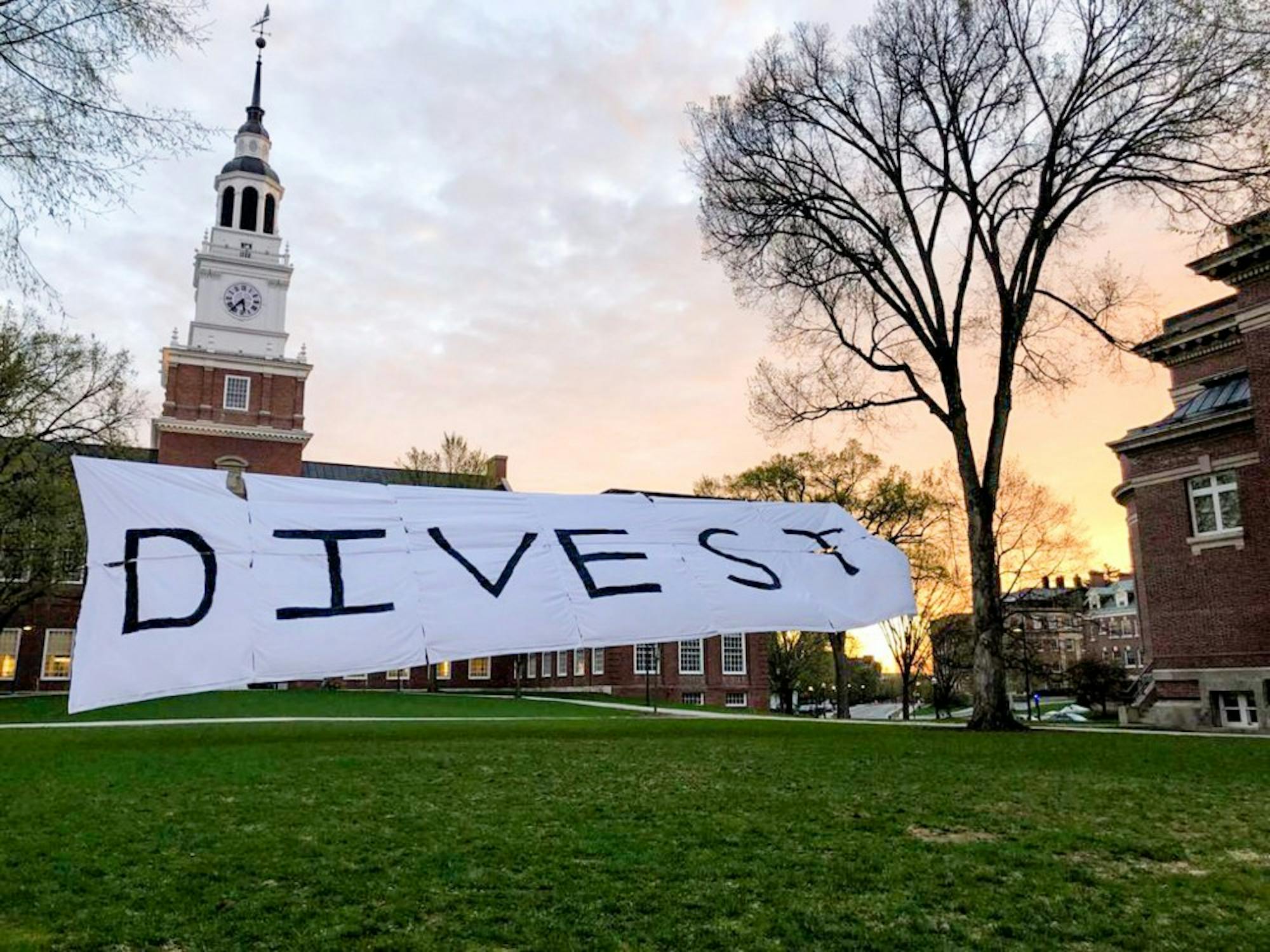After a period of low visibility, Divest Dartmouth is developing a new strategy to urge the College to divest from fossil-fuel related assets. Previously, the group had advocated for divestment from the 200 highest polluting companies, but it has narrowed its call to divestment from oil and gas companies that have not made an effort to develop clean energy or reduce their carbon output.
The campus advocacy group is now focusing on companies that have “egregiously mishandled information and have propagated false science,” according to Divest member Edel Galgon ’22. The new list of companies recommended for divestment was organized by the Union of Concerned Scientists and the Fossil Free Index. The campus organization’s new ask more closely resembles that of the Divest organization of Barnard College, which promised divestment in 2017, according to Galgon.
Alexander Miller ’20, another Divest member, said that he thinks the administration may be more receptive to the new request since it aligns with the College’s standards on academics and honesty. Miller said that the companies they are currently advocating divestment from are “the dirtiest fossil fuel companies that have a history of promoting inaccurate science.”
“Adjusting our ask to fit [the College’s] sensitivities — while that may be a little acquiescent, I think will nevertheless be effective in achieving our goal,” Miller said.
Divest’s actions have intended to promote the “visibility and viability” of divestment, according to Divest member Alexander Crosby ’21. In order to promote visibility, the group has posted fliers and posters around campus and recently hung a large banner reading “divest” in front of Baker Library.
Crosby characterized the banner drop as a powerful visible statement.
Miller echoed the importance of visible actions like the banner drop, since he believes it encourages administration to view the movement as one with longevity.
“It’s always good to place ourselves within the sight lines of the administration, so that they don’t think they can just wait us out,” he said.
Group members regularly meet with College President Phil Hanlon during his office hours, are creating a mock portfolio for a post-divestment endowment and are working closely with the College’s Advisory Committee on Investor Responsibility, according to Crosby.
According to Miller, divestment could happen in one of two ways, both of which require the support of Hanlon. The first way is through the Dartmouth’s investment office and the advisory committee. Divest would need to convince the committee to make a statement in support of divestment, which would then go to Hanlon’s desk, at which point he would decide whether or not to present the statement to the Board of Trustees. If they were to support divestment, the responsibility would then be passed to the College’s investment office to divest from the holdings in the proposed companies and reallocate the investments, according to Miller.
Miller said that the other option for divestment sidesteps the ACIR making a statement and instead involves Hanlon directly approaching the Board with a divestment proposition. In the very near future, Galgon said she thinks that this is unlikely to happen.
She said that in one of her previous conversations with Hanlon during his office hours, he was not receptive to the idea of divestment.
“Hanlon seemed very set in his case as to why he personally sees fossil fuel divestment as a bad idea,” Galgon said.
Miller said Hanlon holds office hours under the condition that what he says is not to be understood as a statement of the College, but a consequence of his personal thoughts and feelings. In spite of this, Crosby, Galgon and Miller acknowledge that conversations with Hanlon are important for maintaining a relationship between Divest and the administration.
“In terms of dialogue with the institution, Dartmouth is in a better place than Harvard,” Crosby said. “Although we aren’t progressing fast, we still have a good relationship with the institution.”
In response to arguments against divestment, Crosby emphasized that Divest “refuses to compromise the integrity of the endowment,” pointing to the fact that only about 0.8 percent of the College’s endowment is invested in fossil fuels. He additionally supported the value of symbolic activism as a moral statement as well as a tool of visibility.
Crosby pointed to historical examples of Dartmouth having divested, including from companies doing business in South Africa during apartheid.
“If people can point to Dartmouth or the eight Ivy Leagues having divested, that could be a strong tool of rhetoric,” Crosby said.
In terms of bringing more people into the movement, Miller said that “our worsening climate reality has done a lot of the heavy lifting for us.” He also feels that the movement is gaining support, largely due to the enthusiasm of members of the Class of 2022.
“It’s a pretty strong class in terms of activism,” Miller said.
Galgon said that she and other group members feel a sense of responsibility towards divestment and climate change as a whole.
“Climate change will hurt the most marginalized communities in the world, and here we are in one of the most privileged places in the world,” she said. “We have a responsibility to recognize that privilege and to work towards climate justice in the ways that we can.”
Group members said their hope is to gain more support for the movement and propose their ask to Hanlon again, and that they are motivated by Middlebury College’s recent decision to divest from fossil fuels, which Crosby described as a “perfect case study for Dartmouth.”


